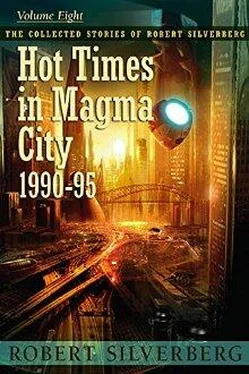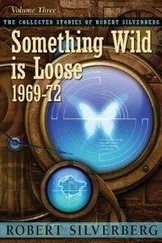Robert Silverberg - The Red Blaze is the Morning
Здесь есть возможность читать онлайн «Robert Silverberg - The Red Blaze is the Morning» весь текст электронной книги совершенно бесплатно (целиком полную версию без сокращений). В некоторых случаях можно слушать аудио, скачать через торрент в формате fb2 и присутствует краткое содержание. Год выпуска: 2014, ISBN: 2014, Издательство: Subterranean Press, Жанр: Фантастика и фэнтези, на английском языке. Описание произведения, (предисловие) а так же отзывы посетителей доступны на портале библиотеки ЛибКат.
- Название:The Red Blaze is the Morning
- Автор:
- Издательство:Subterranean Press
- Жанр:
- Год:2014
- ISBN:978-1-59606-705-9
- Рейтинг книги:3 / 5. Голосов: 1
-
Избранное:Добавить в избранное
- Отзывы:
-
Ваша оценка:
- 60
- 1
- 2
- 3
- 4
- 5
The Red Blaze is the Morning: краткое содержание, описание и аннотация
Предлагаем к чтению аннотацию, описание, краткое содержание или предисловие (зависит от того, что написал сам автор книги «The Red Blaze is the Morning»). Если вы не нашли необходимую информацию о книге — напишите в комментариях, мы постараемся отыскать её.
The Red Blaze is the Morning — читать онлайн бесплатно полную книгу (весь текст) целиком
Ниже представлен текст книги, разбитый по страницам. Система сохранения места последней прочитанной страницы, позволяет с удобством читать онлайн бесплатно книгу «The Red Blaze is the Morning», без необходимости каждый раз заново искать на чём Вы остановились. Поставьте закладку, и сможете в любой момент перейти на страницу, на которой закончили чтение.
Интервал:
Закладка:
Bizarrely, the building seems to be standing on edge, its floors at right angles to the ground. But how can that be? It makes no sense. Then Halvorsen realizes that he is being granted a double perspective: somehow he is able to see the interior of the great structure from the side and top at once, a four-dimensional view, piercing downward and upward and backward and forward through the thousands or perhaps even millions of years of the city’s existence. That puts him at ease. He understands how one reads the multifarious layers of a long-occupied site.
The voice in his mind guides him along.
—The walls you see down there, glowing with scarlet phosphorence, are the oldest levels. On top of these are the structures of the Second Mandala, and then the Third. Here you will recognize the Concord of Worlds and the City of Brass. This is Glissade, the pleasure-city of the Later Third. Here is the palace of the Triple Queen; here, the courtyard of the Emperor of All; down here, the cells of the Tribunal of the People.
Everything is as perfect as the day it was built; and yet simultaneously every layer reveals signs of the destruction wrought by builders of later eras, and over everything else are the brutal marks of some climactic onslaught of vandals: the work, Halvorsen is told, of the bestial invaders who at the dawn of the climactic Fourth Mandala brought fire and death to this place.
In awe Halvorsen tours the temples of unknown gods and the palaces of dynasties yet unborn but already forgotten. He stares at a vast marble slab proclaiming some empire’s grandeur in an incomprehensible script. He enters the Library of Old Stambool, and sees iron-bound chests overflowing with what he understands to be books, though they look more like rubies and emeralds. The guiding voice never ceases, identifying for him the Market of All Wonders, the Gymnasium, the Field of Combat, the Tower of the Winds.
Halvorsen has never seen anything like it. He has never so much as imagined anything like it. It is Rome and Babylon and Byzantium and Thebes all at once, raised to the fiftieth power. In this single crushing vision Halvorson feels that he has experienced an entire great civilization, that he has been buried beneath the totality of its immensity.
Then it is gone. As suddenly as it erupted from the ground, the great building subsides into it again, not with a crash but a sigh, a gentle cadence of descent. It falls like a feather on the wind, shrinking down on itself, and within moments Halvorsen sees nothing but the gray field of rubble again.
After a time he says, “Very impressive. I didn’t know I had such powers of invention.”
—They are not inventions. They are the reality of our age, which I freely make available to you.
“And who are you, may I ask?”
—I will tell you. I am an inhabitant of the Fifth Mandala, which is the last epoch of the world you call Earth, very close to the end of all things.
Halvorsen shivers. The lunacy deepens and deepens.
“You live in the future and are reaching back across time to talk to me?”
—The very distant future, yes.
Halvorsen contemplates that for a moment.
Then he says, “Why? What do you want from me?”
—Simply to give you an opportunity to see my world. And to beg you to allow me to see yours. A trade, my time for your time: your body for mine, our minds to change places. I want that very much. I want it more than life itself.
By day none of what he has heard or seen in the night seems real. There is only the brown sandy site, and the unrelenting red blaze of the sun, and the blue sea, and the different blue of the sky’s rigid vault. From the white tents come his young assistants. The workmen have already breakfasted and are waiting for their assignments. “Gun aydin,” they say, grinning, showing big white crooked teeth. “Good morning.” For them this job is a bonanza, the best pay they will ever see. They love it. “Gun aydin, gun aydin, gun aydin.”
The morning’s work begins. Sunscreen, bug repellent, sweat, dust. Picks, shovels, brushes, tape-measures.
So the madness seems to overtake him, he thinks, only by night. Halvorsen wonders about that. Perhaps the power of his quest for understanding the buried past, here in the remorseless brightness of the day, drives off these phantoms of the imaginary future. Or perhaps it is that the monkish solitude and close atmosphere of his dark, stifling little tent invite hallucinations, especially to a tired man who tends to drink too much raki when he is alone. Either way, he is grateful to leave it behind, the craziness, as he stomps toward this new day’s work.
He believes passionately in archaeology as metaphysics. Without true knowledge of the past, how can one comprehend the present, how can one begin to triangulate the future? Of course true true knowledge is impossible, but we can attempt partial truths: we can skin the earth’s surface looking for clues, we can sift and sort, we can postulate. Halvorsen has spent most of his life doing this. What has it gained him? He can recognize the varying soils of differing layers of occupation. He can name the Emperors of Rome from Augustus to Romulus Augustulus, remembering even to include Quintillus and Florianus. He has—what? Five years left? Ten?—to master all the rest of it, to solve all the pieces of the riddle that he has arrogated to himself. Then he will be gone. He will join the vastness of the past, and the work will belong to others. But for the moment it is his responsibility. And so the work goes on, today for him, tomorrow for the Jane Sparmanns, the Bruce Felds. Will they see it as he does? Or will it merely be a job for them, a highway toward the comforts of tenure? How can you be an archaeologist at all, except out of love, an insatiable desire for the truth, the willingness to give yourself up to quests that may all too easily become obsessions?
Halvorsen’s obsessive notion is that Asia Minor and not Mesopotamia was the cradle of civilization. Fertile, with easy access to the Mediterranean, rich in mineral ores, forests, grasslands for grazing, a reasonably benign climate, the peninsula seems to him to have been an ideal site for the transition from Neolithic life to the splendors of the Bronze Age. The flow of conceptualization could only have been down out of Anatolia’s rocky spine, he is convinced: to Sumerian Iraq on one side of the cultural watershed, to proto-Minoan Crete on the other, and onward also to Egypt in the south. But there is no proof. There is no proof. Mere smudges and traces remain, where he needs walls and pillars, inscribed tablets, potsherds, idols, weapons. Time has erased it all here in Anatolia, or at least has erased what he needs to provide a foundation for his bold thesis, leaving only confusion and conjecture.
Still, he is certain that this is where it all began. The Catal Huyuk findings tell him that, the engraved pebbles in the Karain Cave, the rock paintings of Beldibi: this is where the first canto of the great epic was written. But where is the proof? He knows that he is working from a priori hypotheses, always a great peril for a scientist. This sort of thing is the antithesis of the scientific method. He has allowed himself to seem to be a fanatic, a nut, a Schliemann, an Evans, obsessed with obfuscatory special pleading in defense of his idée fixe . Schliemann and Evans, at least, eventually delivered the goods. But he has nothing to show, and soon they will be laughing at him in the halls of academe, if that has not begun already.
Still, he digs on. What else can he do?
It’s a long day. The new trench gets deeper and longer and it’s still absolutely virgin. Thinking incorrectly that he has spotted something significant jutting from its side, Halvorsen jumps eagerly down into it and wrenches his bad leg so severely that he almost bursts into tears, though they are tears of rage rather than pain. Halvorsen is a big, strapping man whose physical endurance was legendary in the profession, and now he is little more than a cripple. If he could, he would have the leg cut off and replaced with something made of steel and plastic.
Читать дальшеИнтервал:
Закладка:
Похожие книги на «The Red Blaze is the Morning»
Представляем Вашему вниманию похожие книги на «The Red Blaze is the Morning» списком для выбора. Мы отобрали схожую по названию и смыслу литературу в надежде предоставить читателям больше вариантов отыскать новые, интересные, ещё непрочитанные произведения.
Обсуждение, отзывы о книге «The Red Blaze is the Morning» и просто собственные мнения читателей. Оставьте ваши комментарии, напишите, что Вы думаете о произведении, его смысле или главных героях. Укажите что конкретно понравилось, а что нет, и почему Вы так считаете.












